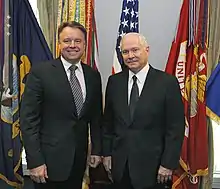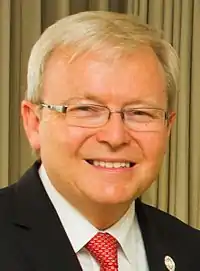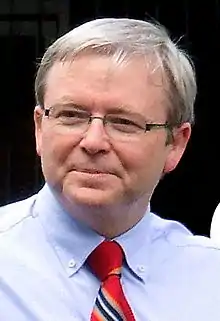Joel Fitzgibbon
Joel Andrew Fitzgibbon (born 16 January 1962) is an Australian politician. He is a member of the Australian Labor Party (ALP) and has served in the House of Representatives since the 1996 federal election, representing the New South Wales seat of Hunter. He served as Minister for Defence (2007–2009) in the first Rudd Government and Minister for Agriculture, Fisheries and Forestry (2013) in the second Rudd Government. He was also Chief Government Whip in the House of Representatives (2010–2013) in the Gillard Government.
Joel Fitzgibbon | |
|---|---|
.jpg.webp) | |
| Minister for Agriculture, Fisheries and Forestry | |
| In office 2 July 2013 – 18 September 2013 | |
| Prime Minister | Kevin Rudd |
| Preceded by | Joe Ludwig |
| Succeeded by | Barnaby Joyce |
| Chief Government Whip in the House of Representatives | |
| In office 27 September 2010 – 14 May 2013 | |
| Prime Minister | Julia Gillard |
| Preceded by | Roger Price |
| Succeeded by | Chris Hayes |
| Minister for Defence | |
| In office 3 December 2007 – 4 June 2009 | |
| Prime Minister | Kevin Rudd |
| Preceded by | Brendan Nelson |
| Succeeded by | John Faulkner |
| Member of the Australian Parliament for Hunter | |
| Assumed office 2 March 1996 | |
| Preceded by | Eric Fitzgibbon |
| Personal details | |
| Born | Joel Andrew Fitzgibbon 16 January 1962 Bellingen, New South Wales, Australia |
| Nationality | Australian |
| Political party | Labor |
| Spouse(s) | Dianne |
| Relations | Eric Fitzgibbon (father) |
| Children | 3 |
| Website | JoelFitzgibbon.com |
Fitzgibbon succeeded his father Eric in federal parliament. He is aligned with the Centre Unity faction in NSW, part of the federal Labor Right faction.[1] Since the 2019 election, he has become a vocal critic of stronger climate change policies, calling a potential 2030 target "delusional",[2] and claiming that any embrace of more ambitious policies will alienate working-class support of Labor.[3][4]
Background
Joel Fitzgibbon was born in Bellingen, New South Wales, and is the son of Eric Fitzgibbon who was MP for Hunter 1984–96. Before entering politics Fitzgibbon was an automotive electrician, electorate officer, part-time technical education lecturer and small business operator. He was a member of the Cessnock City Council in the period 1987–95.
Political career
Joel's father, Eric Fitzgibbon, retired before the 1996 election, and Joel won Labor preselection for the seat. Hunter is one of Labor's few country strongholds; it has been in Labor hands without interruption since 1910. While Joel Fitzgibbon suffered a seven-point swing in 1996, he has been re-elected with little trouble since then, with the exception of the 2013 election, where his margin was significantly reduced. He was elected to the opposition shadow ministry in October 1998 and was appointed Shadow Minister for Mining, Energy and Forestry in 2003–05. In June 2005 he was appointed shadow assistant treasurer and shadow minister for revenue and for small business and competition. In early December 2006, when Kevin Rudd became leader of the opposition, Fitzgibbon was appointed shadow minister for defence. He was subsequently appointed minister for defence when Labor won office at the 2007 federal election.[5]
Minister for Defence

In 2008 Fitzgibbon expressed dissatisfaction with an unclassified briefing he received on an assessment of the Joint Strike Fighter (JSF). He subsequently ordered and received a classified report that addressed his concerns, and then expressed confidence in the JSF project.[6] In the same interview, he denied any personal involvement in the Australian Federal Police (AFP) raid on the home of Canberra Times' journalist Philip Dorling, although he did not guarantee that his department had not contacted the AFP.[6] Dorling was accused of receiving confidential cabinet documents intended for Fitzgibbon.[7]
On 22 October 2008, Fitzgibbon instructed the Department of Defence to cease debt recovery procedures against SAS soldiers who had been accidentally overpaid. A subsequent audit by KPMG discovered that the soldiers' pay continued to be docked after the ministerial instruction.[8]
In May 2009, Fitzgibbon announced a new defence white paper titled Defending Australia in the Asia Pacific Century: Force 2030.[9]
Controversy
On 26 March 2009, Fairfax Media reported that officers in the Department of Defence had conducted a covert and unauthorised investigation into Fitzgibbon's friendship with a Chinese-Australian businesswoman in the belief that it constituted a security risk. This was alleged to have included officers from the Defence Signals Directorate accessing the computer network in Fitzgibbon's office to obtain the woman's bank details.[10][11] The Department launched an urgent inquiry into the reports. Nick Warner, the Department's Secretary, stated that he had not seen any information to confirm the claims and that there were no circumstances in which secret investigations into Ministers could be authorised.[12] Fitzgibbon was reported to be "furious" about the investigation, and suggested that it may have been conducted by officials opposed to his reforms to the Australian Defence Organisation.[11][13]
Fitzgibbon resigned as Minister for Defence on 4 June 2009 after admitting that meetings held between his brother Mark Fitzgibbon, the head of the health fund NIB, and Defence officials concerning business opportunities had breached the Ministerial Code of Conduct.[14]
In 2013, Fitzgibbon reflected on his term as Defence Minister and said that the defence chiefs had an obsession for the JSF and had refused to consider other alternatives.[15]
43rd Parliament
Following his re-election in the 2010 federal election, Fitzgibbon was elected by the Labor caucus as chief government whip.[16]
Following the June 2013 Labor leadership spill, Fitzgibbon was appointed as Minister for Agriculture, Fisheries and Forestry in the Second Rudd ministry.[17]
2015 proposed abolition of Hunter
In 2015 the Australian Electoral Commission announced plans to abolish the federation seat of Hunter. Due to changing populations, overall New South Wales was to lose a seat while Western Australia was to gain an extra seat. Electors in the north of Hunter were to join New England. The roughly 40 percent remainder were to become part of Paterson, with the Liberal margin calculated to be notionally reduced from 9.8 to just 0.5 points as a result. Since the Commission's guidelines require it to preserve the names of original electorates where possible, the commission proposed renaming Charlton to Hunter.[18][19][20]
The final plan, however, saw Charlton abolished, with Hunter pushed slightly eastward to absorb much of Charlton's former territory.[21] While most of the new Hunter's voters come from the old Charlton, as previously mentioned, Commission guidelines required the name of Hunter to be retained.[22] The Labor incumbent for Charlton, Pat Conroy, opted to contest neighbouring Shortland in order to allow Fitzgibbon to contest the new Hunter.
2019 election and aftermath
In the 2019 federal election, Fitzgibbon suffered a 9.5-point swing against him in his electorate, reducing his margin to just 3 points. After the election, he was a vocal critic of his party's direction, claiming that "Labor must reconnect with its blue-collar base and get back to the centre". He stated that he was considering running in the leadership ballot if other candidates do not "show more interest in regional Australia".[23][24] He later endorsed Anthony Albanese as leader, who won unopposed. In November 2020, Fitzgibbon announced that he was quitting the shadow cabinet, a response to moves by Labor's Left Faction to push for more action on climate change which, he believes are "delusional."[25]
Political positions
As the Labor Shadow Agriculture spokesman, Fitzgibbon opposed the Government's decision to stop the sale of S. Kidman & Co as "political" and accused it of running a "discriminatory foreign investment regime".[26]
Fitzgibbon serves as the convenor of the NSW Right faction in federal parliament.[27]
See also
References
- Gartrell, Adam (15 January 2016). "Labor factions engineer deal to keep Joel Fitzgibbon, Pat Conroy in Parliament". Sydney Morning Herald. Retrieved 16 January 2016.
- https://www.theguardian.com/australia-news/2020/nov/09/labor-left-blasts-joel-fitzgibbon-for-publicly-undermining-party-policy
- https://www.abc.net.au/news/2020-11-11/canberra-revolving-door-of-political-leaders-albanese-fitzgibbon/12871760
- https://www.smh.com.au/politics/federal/listen-to-joel-fitzgibbon-albanese-facing-unrest-over-his-leadership-20201110-p56db0.html
- "Rudd hands out portfolios". ABC News. Australia. 29 November 2007. Retrieved 26 January 2015.
- Fitzgibbon, Joel (24 September 2008). "Joel Fitzgibbon joins Lateline". Lateline (Interview: transcript). Interviewed by Leigh Sales. ABC TV. Retrieved 2 July 2013.
- Veness, Peter (23 September 2008). "Police raid home of Canberra Times journalist Philip Dorling". Herald Sun. AAP. Retrieved 26 January 2015.
- Blenkin, Max (31 March 2009). "Govt reveals SAS pay bungle details". Sydney Morning Herald. AAP. Retrieved 2 July 2013.
- "Australia can afford $100b Defence plan: Fitzgibbon". ABC News. 2 May 2009. Retrieved 16 May 2020.
- Rodgers, Emma (26 March 2009). "Defence investigating Fitzgibbon spying claims". ABC News. Australia. Retrieved 26 March 2009.
- Baker, Richard; Dorling, Philip; McKenzie, Nick (26 March 2009). "Defence leaks dirt file on own minister". The Sydney Morning Herald. Retrieved 26 March 2009.
- Rodgers, Emma (26 March 2009). "'No information' to support Fitzgibbon spy claims". ABC News. Australia. Retrieved 26 March 2009.
- Snow, Deborah (26 March 2009). "Reforms behind Liu leak: minister". Sydney Morning Herald. Retrieved 26 March 2009.
- Rodgers, Emma (4 June 2009). "Fitzgibbon resigns as Defence Minister". ABC News. Australia. Retrieved 4 June 2009.
- Lester, Tim (20 February 2013). "Defence chiefs 'obsessed' with troubled fighter jet: Fitzgibbon". The Border Mail. Australia. Retrieved 2 July 2013.
- "Biography for FITZGIBBON, the Hon. Joel Andrew". Parliament of Australia. Retrieved 6 May 2011.
- "Kevin Rudd's new-look ministry". ABC News. 2 July 2013. Retrieved 2 June 2016.
- "Australian Electoral Commission to abolish Federal NSW seat of Hunter". ABC News. Australia. 16 October 2015.
- "Draft federal redistribution of New South Wales". Poll Bludger, Crikey. 16 October 2015.
- "Labor's Joel Fitzgibbon loses his seat in redistribution by Australian Electoral Commission". The Age. 16 October 2015.
- Green, Antony. "Hunter". ABC Election Guide 2016. Australian Broadcasting Corporation.
- "NSW federal redistribution 2015". ABC News. Australia.
- "Joel Fitzgibbon says he will not rule out running for Labor leadership". news.com.au. 20 May 2019. Retrieved 21 May 2019.
- "Joel Fitzgibbon: I may run for Labor leader". news.com.au. 20 May 2019. Retrieved 21 May 2019.
- James, O'Doherty (10 November 2020). "Joel Fitzgibbon quits: 'Labor's lost touch with working people'". The Daily Telegraph. Retrieved 10 November 2020.
- Stephanie Anderson (21 November 2015). "Opposition agriculture spokesman Joel Fitzgibbon slams 'political' decision to block Kidman & Co sale – ABC News (Australian Broadcasting Corporation)". Australian Broadcasting Corporation. Retrieved 14 August 2017.
- Bramston, Troy. "Factional warfare creates Right old mess in search for a leader with a winning chance". The Australian. News Corp. Retrieved 30 May 2019.
External links
- Official website
- Search or browse Hansard for Joel Fitzgibbon at OpenAustralia.org
| Parliament of Australia | ||
|---|---|---|
| Preceded by Eric Fitzgibbon |
Member for Hunter 1996–present |
Incumbent |
| Political offices | ||
| Preceded by Brendan Nelson |
Minister for Defence 2007–2009 |
Succeeded by John Faulkner |
| Preceded by Joe Ludwig |
Minister for Agriculture, Fisheries and Forestry 2013 |
Succeeded by Barnaby Joyce as Minister for Agriculture |

